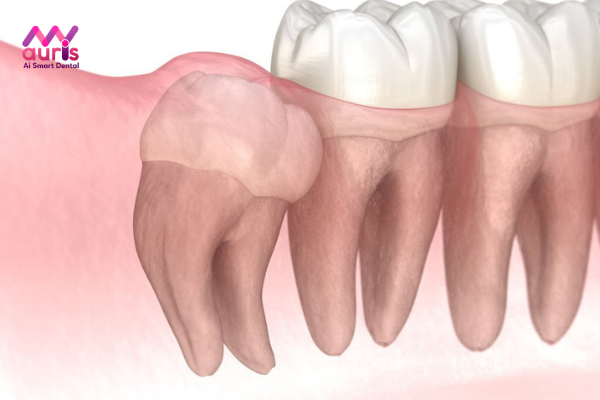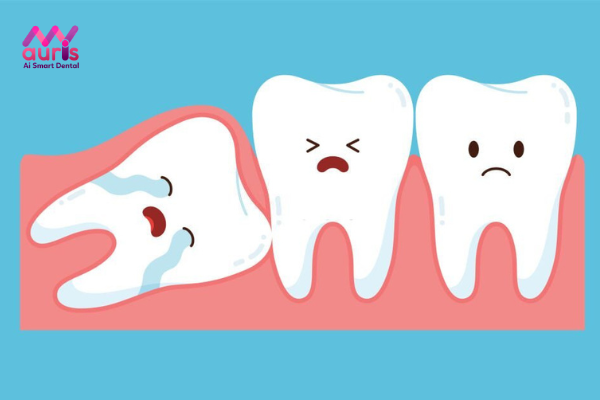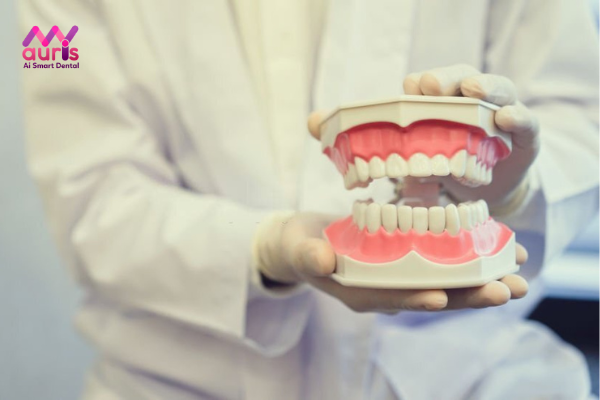According to the doctor, in wisdom tooth extraction cases, wisdom teeth growing underground in the bone are considered the most complicated treatment, because they grow stuck under the gums and cannot be seen by the patient with the naked eye. Therefore, before removing teeth, patients need to be consulted and thoroughly examined by a doctor. This article will provide you with the necessary information related to the problem of impacted wisdom teeth and what to keep in mind.
Learn about impacted wisdom teeth in the bone
Wisdom teeth growing underground in the bone or showing signs of growing under the gums can cause the patient a dull, painful pain. The time it takes for wisdom teeth to grow lasts quite a long time, it can take several months or even up to several years. Therefore, if not treated early, persistent pain can affect the patient’s quality of life. Impacted wisdom teeth are when the growing teeth are covered or stuck under the gums and cannot emerge. The main cause of impacted wisdom teeth is that these teeth tend to grow when the patient is in adulthood, at which time all permanent teeth have fully grown and have perfected the function of eating and chewing.
In addition, the jaw bone structure has almost completely developed, becomes hard and the gums are thicker, so wisdom teeth grow. very difficult. In particular, because there is not enough space to grow, teeth can grow underground under the gums. In addition to being impacted, wisdom teeth can also grow in many different ways such as: Teeth growing backwards, growing sideways or growing crookedly.

Complications caused by wisdom teeth growing underground in the bone
Patients will often be advised by doctors to treat them by removing them as soon as possible to avoid some dangerous consequences for oral health as well as avoid negative effects on quality of life. You can refer to some of the following complications:
Causes gingivitis
This is one of the common complications in any case of wisdom teeth growing. If the patient does not treat their wisdom teeth completely, but their wisdom teeth recur many times, it can lead to serious periodontitis. The symptom is the appearance of pus pockets around the roots of the teeth. Over time, it can spread and affect many other areas such as the neck, bones or cheeks, etc. Therefore, you need to be treated completely to avoid affecting your health.
Patients may have jaw cysts
The condition of wisdom teeth growing underground in the bone can damage the jaw structure and surrounding nerves, the name for this case is jaw bone cyst. Accordingly, the tissue and jawbone showing signs of cysts need to be completely removed if the condition does not get worse.
There may be sensory and reflex disorders
There are many facial nerves and sensory nerves located at the location where wisdom teeth grow, so wisdom teeth have a direct impact on the nerves. In cases where wisdom teeth grow underground and show signs of pressing on the nerves, it can numb or cause loss of sensation in the mucous membranes, lips, skin, etc. In addition, some people will feel pain in the facial area when the nerves are affected.
Causing inflammation infection
The most visible case of infection is gingivitis, where the gums cover the entire tooth crown. At this time, the gums are red, not firm and show signs of bleeding as well as an unpleasant odor, causing the patient to lose their appetite when eating, increasing the risk of related dental diseases such as periodontitis.
Through the above serious complications that you can suffer if not treated early, following your doctor’s advice, removing impacted wisdom teeth is necessary. If you feel signs of swelling in the gum area or persistent, dull pain, you need to go to a dental facility to be examined immediately to avoid the disease from getting worse or the treatment process becoming more difficult and costly.
Regardless of whether wisdom teeth are growing straight, impacted or misaligned, regular monitoring from the moment the teeth start showing signs of growth is essential if you do not want your health to be affected and your quality of life to decrease.

Notes to know when removing impacted wisdom teeth in the bone
After removing impacted wisdom teeth
- The patient needs to bite firmly gauze for about 1 hour after extraction to stop the bleeding, do not suck or poke the newly extracted tooth socket. If there is still bleeding, you need to bite on the gauze for another hour.
- Can use painkillers to reduce unpleasant pain after the anesthetic wears off Follow the doctor’s instructions regarding type and dosage. Some pain relievers you can refer to: Paracetamol, alaxan,…
- Patients need to gargle with diluted salt water to limit bacterial attack.
Pay attention to oral care
After tooth extraction, tooth hygiene is extremely necessary to remove bacteria in the oral cavity and to keep the wound clean. In case of not paying attention to regular oral hygiene Regularly, the newly extracted tooth area will become infected and suffer from a number of related dental diseases: Periodontitis, gingivitis, etc.
Patients also need to pay attention to resting for a few days after the tooth extraction. When resting, you should lie on a high pillow to avoid prolonged bleeding or blood flowing back inside.
Regarding diet, patients also need to avoid eating hard, cold foods and instead eat soft foods such as porridge or soup. In addition, they need to supplement some substances such as vitamin A, iron and protein. Patients should be careful not to use stimulants because they can affect the wound healing process.

In short, wisdom teeth growing underground in the bone need to be treated as quickly as possible by removing them to avoid dangerous complications in the future. You need to go to reputable dental facilities to be examined and treated according to the correct procedure, to avoid losing money and disability. You can contact My Auris dentistry via email to Get detailed advice and answers on issues related to diseases and problemsDental topics are more detailed.
Yen Nhi





